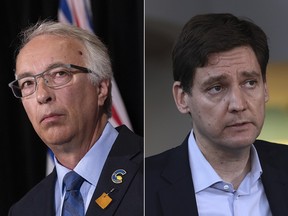Pierre Poilievre’s coattail effect is at play in the Oct. 19 provincial vote, and Canadians across the country should be paying attention.

Article content
Provincial electoral campaigns in New Brunswick, Saskatchewan and British Columbia are all underway. Federal and provincial electoral arenas are different beasts, with voters often expressing wide variance in their preferences in elections across the two levels of government. Nonetheless, with a federal election looming ever larger in the near distance, the electoral campaign in British Columbia, especially, merits attention.
Advertisement 2
Story continues below
Article content
The Oct. 19 vote serves as a critical electoral test for the right-wing populist juggernaut reaching critical masses of support across Canada as the population indicates it is in the mood for change
The B.C. Conservatives led by John Rustad pose a serious threat to the re-election of the New Democratic Party government. A year ago, Rustad’s outfit was in distant second place, tied in support with BC United in an inefficient split of centre-right and conservative votes that made an NDP majority government seemingly a foregone conclusion.
Now the B.C. Conservatives are tied in polling with the NDP with a potentially more efficient vote distribution in the metro Vancouver area that could push them over the top to form government. It is a truly remarkable rise to fortune for a party that last formed single-party government close to 100 years ago
David Eby’s NDP government is suffering under the weight of incumbency amid the most acute crises in housing affordability and drug addiction in the country. The harm-reduction approach of the NDP in response to the opioid crisis has come under attack — a bitter debate we can expect to extend across the country in the coming federal election.
Advertisement 3
Story continues below
Article content
Provincial NDP brands in the West are much stronger and distinct from their federal counterpart. In announcing policies designed to tack to the centre, Eby has been careful to draw out several key lines of demarcation from Jagmeet Singh lest any residual negative associations of the confidence-and-supply agreement with Trudeau’s Liberals in the House of Commons threaten the re-election effort in B.C.
Rustad is an ex-B.C. Liberal cabinet minister expelled from caucus (on his birthday, no less) for refusing to delete a tweet questioning the causal effect of carbon emissions on climate change. The calamitous rebranding of the B.C. Liberals to BC United under the abject leadership of Kevin Falcon created the opening for Rustad’s unlikely Conservative revival. This rebranding is destined go down as among the most egregious own goals in Canadian political history, resulting in a storied party of government being all but disbanded on Aug. 28 rather than contest an election that portended nothing but humiliation.
The surging federal Conservatives under the populist leadership of Pierre Poilievre has had a remarkable coattail effect on their British Columbian cousins. The speed and scale of the BC Conservatives’ unexpected growth in the slipstream of the federal Tories has given the party little time to develop the sophisticated and expensive on-the-ground voter identification and mobilization infrastructure common to modern campaigns. Bridging that gap with the much better oiled and organized NDP get-out-the-vote operation is largely being hedged on enthusiasm for conservative populism among their potential voters.
Advertisement 4
Story continues below
Article content
So profound is this coattail effect that, in what reads as an act of desperation, the NDP petitioned the courts to insert the text “B.C.” on the ballot, lest voters think they were casting their lot in with Poilievre’s Conservative Party.
Rustad is notably to the right of Poilievre (himself no moderate), however, on several key issues and is leading such a new and untested organization that little in the way of party discipline is to be expected.
Former BC United party operatives hostile to Rustad have since dumped close to 200 pages of opposition research designed to hang scandals on B.C. Tory candidates into the NDPs’ hands, including footage of Rustad espousing conspiratorial rhetoric as recently as this summer. It remains to be fully seen whether this and other potential scandals — such as Conservative candidates repeating Donald Trump’s false claim that the 2020 election was stolen — can be shrugged off or if voters will balk. So far it does not appear to be reversing the party’s momentum.
The election will provide a critical pulse check for how far the populist tide could wash in — and Canadians across the country should be paying attention.
Dónal Gill is assistant professor of Canadian politics at Concordia University.
Recommended from Editorial
Advertisement 5
Story continues below
Article content
Article content


Comments